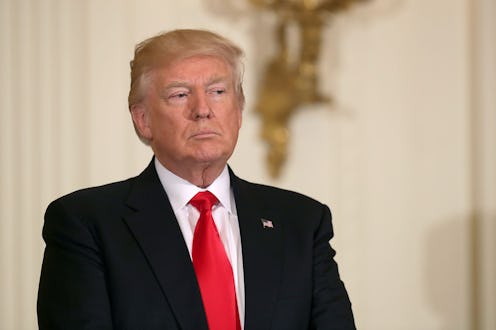News
The Steps In The Impeachment Process Are Considerable

The calls to impeach President Trump pre-date his inauguration. But on Tuesday, the legal case for doing so received a compelling boost via a New York Times report alleging the president asked former FBI Director James Comey to back off his investigation into Trump's previous National Security Adviser, retired Gen. Michael Flynn. According to many legal scholars, that implied directive could constitute obstruction of justice, which is an impeachable offense. But the myriad steps in the impeachment process make forcing Trump out of office, for now, a far-off reality.
From a technical standpoint, there are a series of events that occur during an impeachment. First off, either the Justice Department or an independent counsel appointed by Congress would need to look into the evidence, and hand their findings over to the House Judiciary Committee (HJC). Older readers might be unaware they're already familiar with this process, as it was how special investigator Ken Starr delivered his findings on President Clinton to House Republicans.
The HJC then reviews those findings, and decides if they constitute further action or can be put aside. If the HJC concludes that criminal misconduct occurred, they will move to step three: draft up the actual Articles of Impeachment.
Once those Articles are put forth, the House debates their merit, and goes on to take a vote on whether the president should or should not be impeached. This is a simple majority vote, which means many (but by no means, all) Republicans would have to join with an (assumedly) unanimous vote by the House Democrats to reach a majority. If that happens, Trump would be considered "impeached."
Of course, that's exactly what happened with President Clinton. But he stayed in office for his full second term, and that's because the Senate hadn't yet had its say. For it is in the upper chamber where the president will face an actual "trial" of sorts. The HJC acts as prosecutor, presenting its evidence against the president. The POTUS brings his own lawyers, and the Chief Justice of the Supreme Court (which in this case would be John Roberts) serves as judge, deciding what evidence is and is not allowed. The senators are the jury.
Unlike the standards in a regular court case, the Senate "jury" doesn't have to come to a unanimous conclusion. But they do require a two-thirds vote in favor of removing the president. And that seems unlikely as of now, given the Republican domination of the Senate.
But it does seem plausible that enough evidence might leak out to eventually sway a majority of Republicans away from supporting Trump. With Rep. Jason Chaffetz, chairman of the House Oversight Committee, now calling for the FBI to hand over all of Comey's memos related to Trump, it looks at least possible that the paper trail left by Comey will be strong enough to kick start impeachment proceedings.
Trump's recent "accidental" leak of classified intel to Russian foreign officials does nothing to help his case. There's also the gaping problem of an understaffed administration, and an inner Trump circle that has been compromised by several of its members own connections to foreign powers.
Perhaps the most glaring indicator of Trump's ripeness for impeachment are his plummeting poll numbers. Public sentiment is the number one factor for any impeachment development, according to Bruce Fein. And he should know, as a former official at the Justice Department under President Reagan, and a man intimately familiar with the impeachment proceedings brought against President Clinton.
Still, government wheels are usually slow to turn. So even if impeachment proceedings get under way, don't expect a "President Mike Pence" (yep) anytime soon.